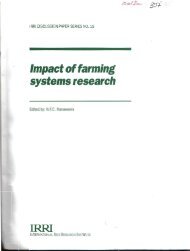Naz, Antonia Corinthia C and Mario Tuscan N. Naz. 2006. Modeling ...
Naz, Antonia Corinthia C and Mario Tuscan N. Naz. 2006. Modeling ...
Naz, Antonia Corinthia C and Mario Tuscan N. Naz. 2006. Modeling ...
You also want an ePaper? Increase the reach of your titles
YUMPU automatically turns print PDFs into web optimized ePapers that Google loves.
Table 1: Estimated Costs of Sanitary L<strong>and</strong>fill Construction <strong>and</strong> Operation<br />
City Cost of<br />
Sanitary<br />
L<strong>and</strong>fill, SLF<br />
(PhP Million)<br />
Capacity,<br />
(‘000 m 3 )<br />
Useful Life<br />
of SLF,<br />
years<br />
Total Capital<br />
Investment<br />
Cost*<br />
(PhP’000)<br />
Annual<br />
Operating<br />
Cost **<br />
(PhP’000)<br />
Proposed<br />
Mode of<br />
Financing<br />
Legaspi City 96 280 8.4 256,520 9,749 Loan<br />
Butuan City 113 620 15 305,360 10,721 Loan<br />
Muñoz City 99 510 8-11*** 196,570 5,602 Loan<br />
*These include the cost of the SLF <strong>and</strong> other infrastructure like material recovery facilities, compost<br />
plant, leachate treatment plant <strong>and</strong> collection vehicles<br />
** These include personnel, electricity, fuel, repair, supplies, etc.<br />
***The life of the SLF would be shorter in case it accepts wastes from surrounding municipalities <strong>and</strong><br />
cities<br />
2.3. Financing of Solid Waste Management Services<br />
Schubeler (in UNDP/UNCHS, 1996) mentions three main options for financing<br />
the recurrent costs of municipal SWM: user charges, local taxes <strong>and</strong> intergovernmental<br />
transfers. To promote the responsiveness of the supplying agency to user needs <strong>and</strong><br />
ensure that collected funds are actually applied to waste management, it is preferable to<br />
finance operations through user charges rather than general tax revenues. Adding solid<br />
waste charges to utility charges may increase collection efficiency. User charges should<br />
be based on the actual costs of solid waste management, <strong>and</strong> related to the volume of<br />
collection service provided. Among larger waste generators, variable fees may be used<br />
to manage the dem<strong>and</strong> for waste services by providing incentive for waste<br />
minimization. To achieve equity of waste service access, some cross-subsidization<br />
<strong>and</strong>/or financing out of general revenues will be required.<br />
Transfers from national governments (NG) to local governments may encourage<br />
specific type of expenditures, such as education, health, or environmental protection.<br />
Conditional or matching grants will create that incentive <strong>and</strong> may therefore induce<br />
investment at a lower cost (smaller transfer) for the national government. These grants<br />
effectively reduce the relative cost of providing sanitary l<strong>and</strong>fill services relative to the<br />
cost of providing other local public goods. For example, in the United States, the<br />
Federal Government offers up to 90 percent of grants for the construction solid waste<br />
management facilities. On the ground of both economic efficiency <strong>and</strong> equity, transfers<br />
from NG to LGUs are justified to support the costs of improving solid waste<br />
management facilities, <strong>and</strong> to support the incremental costs associated with the adoption<br />
of sanitary l<strong>and</strong>fills. If possible, the NG may wish to provide technical <strong>and</strong>/or financial<br />
assistance to clusters of LGUs to help reduce the transaction costs associated with the<br />
negotiation <strong>and</strong> design of the contractual agreement (Laplante, 2001).<br />
Cointreau-Levine (2000) posits that the collection of user charges enables the<br />
service to be financially sustainable. Surveys can indicate which methods of waste<br />
collection are preferred <strong>and</strong> also provide information on households' ability to pay for<br />
the service. In developing countries, most local governments experience a serious<br />
shortfall in meeting their revenue needs from their tax base. User charges, as one means<br />
to cover solid waste costs, should not be neglected, even though most solid waste<br />
management services are public goods. User charges give the solid waste agency some<br />
autonomy by eliminating the need to compete with other government agencies for their<br />
share of general revenue.<br />
6
















